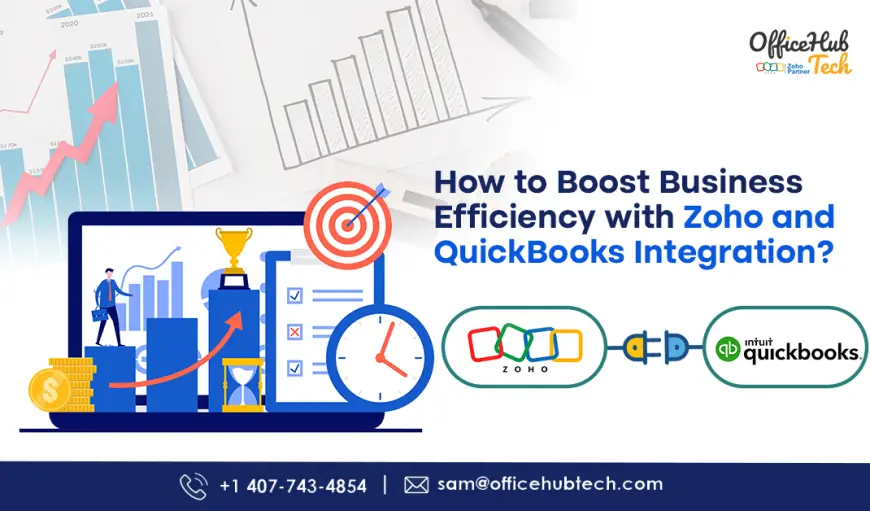How to Boost Business Efficiency with Zoho and QuickBooks Integration?

In today’s fast-moving business landscape, operational efficiency isn’t just an advantage—it’s essential. Many companies rely on Zoho for CRM and workflow automation, while QuickBooks remains a staple for financial management. However, when these platforms operate independently, businesses often encounter fragmented data, duplicated efforts, and slowed decision-making. Integrating Zoho and QuickBooks bridges this gap, creating a unified ecosystem that drives both operational precision and financial clarity.
Why Integrate Zoho with QuickBooks?
Businesses typically span multiple functions—sales, finance, inventory, and customer service. Operating in silos leads to misaligned data, redundant tasks, and poor insights. Connecting Zoho with QuickBooks ensures information flows automatically across your systems, eliminating manual input, reducing errors, and empowering teams with a 360° view of operations and finance.
Automating Financial Workflows
Manual invoice creation and reconciliation wastes time and invites errors. When integrated:
- Invoices created in Zoho CRM flow instantly into QuickBooks.
- Payment receipts and payment statuses reflect back in Zoho.
- Purchase orders issued in Zoho are automatically mirrored in QuickBooks.
This seamless sync ensures real-time financial accuracy, freeing teams to focus on strategy rather than data entry.
Smarter Inventory Management
For retail, manufacturing, or e-commerce, precise inventory control can mean the difference between profits and losses.
- Sales in Zoho Inventory immediately adjust stock levels.
- Stock reports and financial transactions sync automatically with QuickBooks.
- Businesses can confidently avoid both overstocking and out-of-stock risks.
With this integration, inventory stays accurate, and fulfillment processes stay smooth.
Empowering Sales Teams
Zoho sales reps benefit from integrated financial context:
- View each customer’s invoice history and outstanding payments within the CRM.
- Proactively address delays, upsell opportunities, or payment negotiations.
- Use financial visibility to personalize offers and improve client relationships.
This unified data empowers sales reps to deliver not just pitches, but preciseness.
Unified Reporting & Analytics
Disconnected systems make reporting a puzzle. With integration, companies can:
- Combine sales, expense, and inventory data into a single Zoho Analytics dashboard.
- Track metrics like revenue, average order size, expense ratios, and payment cycles.
- Make data-driven decisions on budget, pricing strategy, and inventory by analyzing integrated insights.
Accelerated Invoicing and Payment Processes
A unified system enhances cashflow:
- Generate invoices in Zoho CRM and have them appear in QuickBooks automatically.
- Track payments across platforms and reduce follow-up delays.
- Access real-time insights to identify overdue payments and act swiftly.
Reducing Admin Burden
Eliminate repetitive tasks and allow employees to focus on revenue-generating tasks:
- Contact details entered in Zoho populate automatically in QuickBooks.
- Updates in QuickBooks, like payment status, reflect instantly in Zoho.
- Accounting, sales, and customer service teams work from shared data—no silos, no delays.
Ensuring Data Accuracy & Compliance
Accurate, consistent data is vital for reporting and audits.
- Integration keeps customer, sales, and financial data synchronized.
- Reports remain clean, comprehensive, and audit-ready.
- Improved data reliability fosters trust with stakeholders.
Scaling with Confidence
Disconnected systems strangle growth. Integrated systems grow with you.
- Add new sales channels or branches while keeping all workflows connected.
- Avoid bottlenecks that arise from manual synchronizing.
- Build a scalable digital foundation for rapid growth and expansion.
Why Smooth Implementation Matters
Integration needs accuracy. Implementation errors can jeopardize data and operations. A Wise provider will:
- Map workflows to determine what data flows between Zoho and QuickBooks.
- Configure real-time sync to prevent gaps and duplication.
- Provide end-user training to ensure adoption and maximize benefits.
Centralized, Customized Connectivity with OfficeHub Tech
If you're looking to unlock the full potential of your Zoho–QuickBooks data stream, you need more than standard integration—you need a partner.
OfficeHub Tech specializes in:
- Customized Zoho–QuickBooks integrations tailored to workflows.
- Deep understanding of data mapping, automation, and real-time sync.
- Training and dedicated support to drive adoption and right-first-time use.
- Transparent, affordable pricing without surprise add-ons.
Real Results You Can Expect
- Cut admin time by up to 50% by automating manual data copying
- Eliminate billing delays, ensuring invoices are promptly issued and recognized
- Gain clarity on cash flows, inventory, and customer finances with unified dashboards
- Scale easily, with consistent processes ready for expansion
Final Thoughts
Standalone software limits your potential. Integrating Zoho and QuickBooks is not just a technical upgrade—it’s a strategic shift toward streamlined operations, improved collaboration, and smarter decision-making. With the right partner, you transform disconnected systems into a single, powerful business engine.
Ready to integrate efficiency into your workflows?
Let’s tailor a Zoho–QuickBooks integration that fits your exact needs.
? Book a Free Consultation: https://calendly.com/officehubtech
? Email: [email protected]
? Call: (407) 743‑4854
? Visit: officehubtech.com
What's Your Reaction?
 Like
0
Like
0
 Dislike
0
Dislike
0
 Love
0
Love
0
 Funny
0
Funny
0
 Angry
0
Angry
0
 Sad
0
Sad
0
 Wow
0
Wow
0
















































